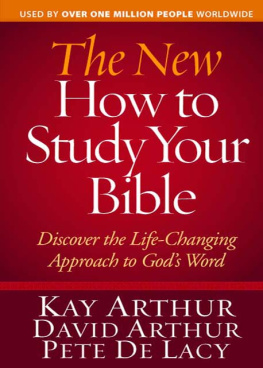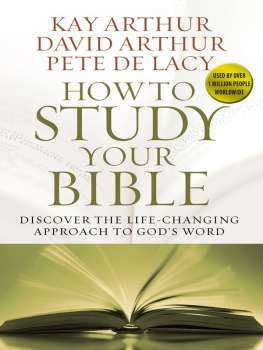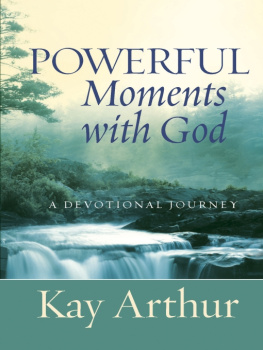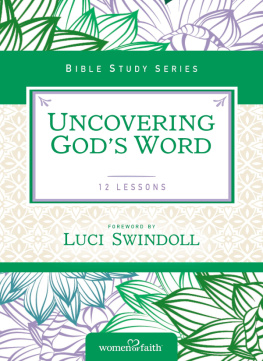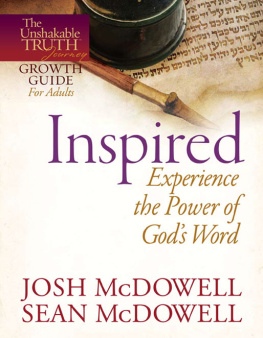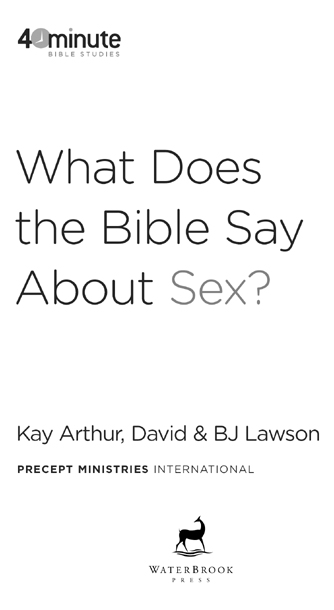W HAT D OES THE B IBLE S AY A BOUT S EX?
P UBLISHED BY W ATER B ROOK P RESS
12265 Oracle Boulevard, Suite 200
Colorado Springs, Colorado 80921
All Scripture quotations, unless otherwise indicated, are taken from the New American Standard Bible (NASB) , Copyright The Lockman Foundation 1960, 1962, 1963, 1968, 1971, 1972, 1973, 1975, 1977, 1995. Used by permission. (www.Lockman.org). Scripture quotations marked (KJV) are taken from the King James Version.
Italics in Scripture quotations reflect the authors added emphasis.
eISBN: 978-0-307-76916-9
Copyright 2008 by Precept Ministries International
All rights reserved. No part of this book may be reproduced or transmitted in any form or by any means, electronic or mechanical, including photocopying and recording, or by any information storage and retrieval system, without permission in writing from the publisher.
Published in the United States by WaterBrook Multnomah, an imprint of the Crown Publishing Group, a division of Random House Inc., New York.
W ATER B ROOK and its deer colophon are registered trademarks of Random House Inc.
v3.1_r2
CONTENTS
HOW TO USE THIS STUDY
This small-group study is for people who are interested in learning for themselves more about what the Bible says on various subjects, but who have only limited time to meet together. Its ideal, for example, for a lunch group at work, an early morning mens group, a young mothers group meeting in a home, a Sunday-school class, or even family devotions. (Its also ideal for small groups that typically have longer meeting timessuch as evening groups or Saturday morning groupsbut want to devote only a portion of their time together to actual study, while reserving the rest for prayer, fellowship, or other activities.)
This book is designed so that all the groups participants will complete each lessons study activities at the same time. Discussing your insights drawn from what God says about the subject reveals exciting, life-impacting truths.
Although its a group study, youll need a facilitator to lead the study and keep the discussion moving. (This persons function is not that of a lecturer or teacher. However, when this book is used in a Sunday-school class or similar setting, the teacher should feel free to lead more directly and to bring in other insights in addition to those provided in each weeks lesson.)
If you are your groups facilitator, the leader, here are some helpful points for making your job easier:
- Go through the lesson and mark the text before you lead the group. This will give you increased familiarity with the material and will enable you to facilitate the group with greater ease. It may be easier for you to lead the group through the instructions for marking if you, as a leader, choose a specific color for each symbol you mark.
- As you lead the group, start at the beginning of the text and simply read it aloud in the order it appears in the lesson, including the insight boxes, which appear throughout. Work through the lesson together, observing and discussing what you learn. As you read the Scripture verses, have the group say aloud the word they are marking in the text.
- The discussion questions are there simply to help you cover the material. As the class moves into the discussion, many times you will find that they will cover the questions on their own. Remember, the discussion questions are there to guide the group through the topic, not to squelch discussion.
- Remember how important it is for people to verbalize their answers and discoveries. This greatly strengthens their personal understanding of each weeks lesson. Try to ensure that everyone has plenty of opportunity to contribute to each weeks discussions.
- Keep the discussion moving. This may mean spending more time on some parts of the study than on others. If necessary, you should feel free to spread out a lesson over more than one session. However, remember that you dont want to slow the pace too much. Its much better to leave everyone wanting more than to have people dropping out because of declining interest.
- If the validity or accuracy of some of the answers seems questionable, you can gently and cheerfully remind the group to stay focused on the truth of the Scriptures. Your object is to learn what the Bible says, not to engage in human philosophy. Simply stick with the Scriptures and give God the opportunity to speak. His Word is truth (John 17:17)!
WHAT DOES THE BIBLE SAY ABOUT SEX?
S ex! Everyone is talking about it, yet many people are uncomfortable having honest conversations on this topic. If you bring God into the discussion, people often grow even more uncomfortable. Many find it hard to believe that God would care about this facet of their lives, while others resent what they see as interference with a private matter. Perhaps you are among those who consider their sexual behavior to be completely separate from their faith.
As our culture has grown more obsessed with sex, various misconceptions have cropped up, leaving people both inside and outside of the church confused and asking questions such as
Why does God hate sex?
Does my choice of sexual expression really matter?
Whatever we do is okay as long as we love each other, right?
If love makes it okay, why do I sometimes feel guilty?
How far is too far if were not married?
God has a lot to say in His Word about sex, both inside and outside of marriage. You may be surprised to learn that He is not antisex. On the contrary, He invented sex and values it so much that He wants to help us deal with it properly.
We will spend the next six weeks looking at what the Designer of sex says about His intention for this priceless gift.
WEEK ONE
Many people believe that sex is a physical need that must be fulfilled just as our need for food and water must be met. They consider it just another animal appetite to be satisfied, without any deeper spiritual meaning. In this lesson well look at the true origins of sexwho invented it, why it was created, and what boundaries, if any, were designed to protect it.
OBSERVE
Lets go back to the very beginning, to Genesis, the first book of the Bible, and see what God says about the first union between a man and a woman.
Leader:Read Genesis 1:2528 aloud. Have the group say aloud and
- mark every reference toGod, including pronouns such asOur, Us, andHis, with a triangle, like this:

- draw a box around every reference toman, including the pronounshimandthem:

As you read the text, its helpful to have the group say the key words aloud as they mark them. This way everyone will be sure they are marking every occurrence of the word, includingany synonymous words or phrases. Do this throughout the study.
DISCUSS
- What did you learn from marking the references to man?
- Who created man?


